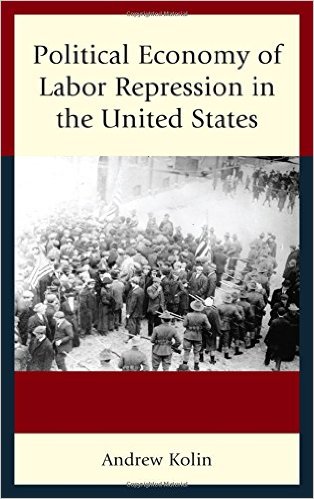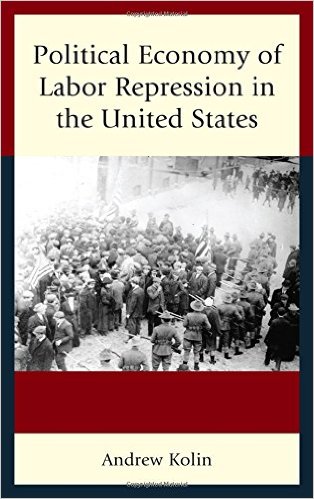By Andrew Kolin | (Informed Comment) | – –
According to a recent article in the Wall Street Journal, “Labor Unions Step Up Presidential Election Spending,” labor unions contributed to Hillary Clinton at a scale that is without precedent. The article pointed to $108.2 million contributed in this presidential election cycle. These contributions raise questions and are a political symptom of a larger problem for organized labor. One obvious question is, did Clinton’s campaign rhetoric on labor match her record? The largest labor unions, such as the American Federation of Teachers, the International Brotherhood of Electrical Workers, the International Brotherhood of Teamsters, the Service Employees International Union and the United Food and Commercial Workers Union all have endorsed Clinton. But her record is not exactly pro-labor. As First Lady of Arkansas and as Secretary of State, her actions were actually anti-labor.
Given Clinton’s loss, and her inability to attract as many votes from workers as had Barack Obama, does organized labor need to rethink?

Andrew Kolin, The Political Economy of Labor Repression in the United States
In Arkansas, from 1986-92, as a board member for the retail giant WalMart, she was silent on labor issues and bestowed praise on Sam Walton. She continued her association with Walmart in the 2016 election. In fact, Alice Walton, Sam’s daughter, contributed $350,000 to Clinton’s campaign. Her record on trade also is clear: Secretary Clinton never saw a free trade agreement she did not like. She supported NAFTA and the Trans-Pacific Partnership agreement and only back-pedaled after Bernie Sanders put her on the defensive in the primary.
The question is, why does labor continue to support Democratic Party candidates who, once in office, abandon or ignore labor? Because labor’s collaboration with the Democratic Party is not a free choice. To explain labor’s ties to the Democratic Party, it is essential to examine the history of labor repression in the United States, the subject matter of my new book, “The Political Economy of Labor Repression in the United States.” Labor’s association with the Democratic Party is the result of institutional exclusion dating back to the Post-Revolution Era. Institutional exclusion from policy-making in the state and economy is produced and reproduced as political and economic elites have established a monopoly over the resources of power. This institutional exclusion is recreated through the use of covert and overt repression. Covert repression is built into the fabric of both the state and the workplace in order to exclude labor from decision-making. Overt repression is publicly expressed through violence and the legal system.
To make a long historical story short, labor only began to achieve a greater role in institutional decision-making during the Depression in the context of the New Deal. At that point in time, organized labor’s collaboration with Roosevelt’s Democratic Party began. In this collaboration labor was, at best, a junior partner in decision-making. The return of the Communist Party and its association with the CIO, fostered a greater role for organized labor in the workplace.
Fast forward: labor anti-Communism, the Cold War and the economy’s downward shift starting in the 1970s limited any gains that labor had made in the previous decades. As the New Deal coalition, which labor was part of, collapsed, and as finance capital assumed a more dominant role, the managerial state shrank as new Democrats, from Carter to Clinton, turned their backs on organized labor. In the workplace, starting in the 1980s, a leaner and meaner version of capital expanded the use of contingent and temporary labor, engaging in strike-breaking, further undermining unions.
The question is: where does this leave labor after this presidential election and in the 21st century? The challenge is for labor to fight to initiate reforms that truly uplift the working class. To do this, organized labor will have to disengage from its current collaboration with the Democratic Party and, functioning as an independent social movement, work toward creating genuine political and economic democracy.
Andrew Kolin is Professor of Political Science at Hilbert College and author of The Political Economy of Labor Repression in the United States



 © 2026 All Rights Reserved
© 2026 All Rights Reserved